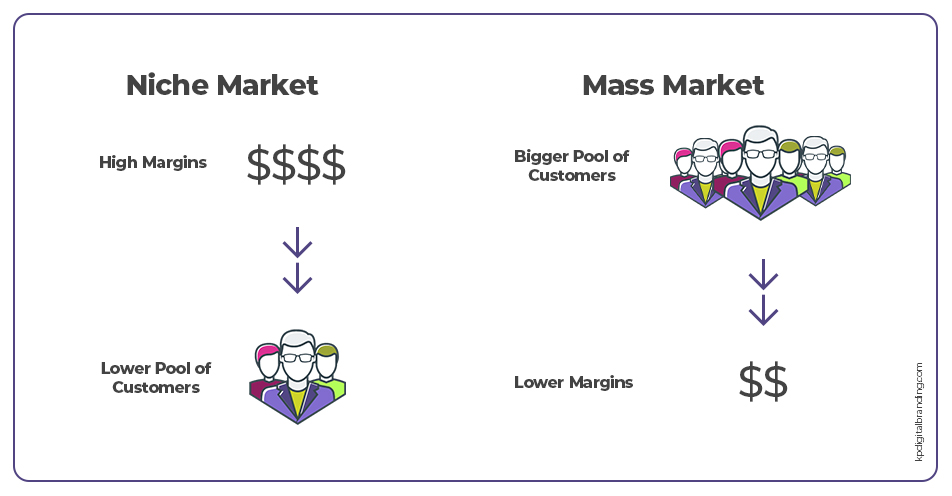You may have heard coaches and marketers tell you to focus on niche marketing, but what does that actually mean?
Consider this: Do you keep getting subscribers and followers that don’t really engage?
Maybe you run a service-based business and you continuously draw in customers that you realize you really don’t like? (It’s okay. You can admit it.)
Or maybe you’re just starting out with your product or service-based business, and you’ve discovered that your market is way more saturated than you’d initially thought. All you want to do is be heard through all the noise.
The answer to all of these issues likely lies in narrowing in on a niche market.
Let’s talk about what a niche market is, why it’s essential for maximum profits, and the ways you can zero in on that sneaky little profitable niche within your industry.
What is a Niche Market?
Let’s take it all the way back to 1994: zip drives were just being introduced, Forest Gump was everybody’s friend in their head, and the planet had 2 billion fewer folks. Dang.
Another important conversation was happening between professors and researchers Maarten Leeuw and Tevfik Dalgic, who in 1994 answered the question ‘what is a niche market’ this way:
“We consider a niche to be a small market consisting of an individual customer or a small group of customers with similar characteristics or needs.”

Niche marketing goes by a few other nicknames: focused marketing, micro-marketing, and concentrated marketing. But those have slight variances in meaning.
You may have also heard niche marketing referred to as market segmentation. These terms aren’t exactly the same either, but they’ve been used interchangeably over the years.
For the sake of giving you the most straightforward explanation of a niche market possible, let’s dive a little deeper into the difference between a niche market and a market segment.
Larger brands tend to like the term “market segment” because it doesn’t sound as small and restrictive as “niche” does. It also just boils down to size: segments are bigger than niches. Segments are made by the bigwigs to make a big market a little more manageable. Niches are created by the consumer and the consumer’s need.
People don’t buy a product or service. People buy solutions to a problem or pain point, and niches play very heavily into this. Keep that in mind throughout your entrepreneurial journey and you can’t go wrong.
What Are Examples of Niche Marketing?
Let’s begin with some general examples.
Say you have some serious bunions on your feet that scream every time you try and put on your favorite heels. A regular old general practitioner wouldn’t be able to do much about that. You’d want to call a specialist – A podiatrist.
This is a niche.
Maybe you need a floor length evening gown for your friend’s wedding. (She’s bougie that way.) You’re not about to hit up your local Target for that. You’d need a boutique that specializes in eveningwear.
This is a niche.
You may have noticed a trend: specialization and expertise. We’re going to talk about how to narrow in on that specialty in just a sec.
Let’s explore some real-world examples of a niche first.
Maya’s Cookies
The black-owned company, Mayas Cookies, saw an underserved market within the saturated sweets and baked goods industry and built a loyal customer base.
Maya serves the part of the population that has problems breaking down foods that are made using animal products. With high-quality ingredients and a desire to serve, Maya cashed in on a niche and became the #1 Black-Owned Gourmet Vegan Cookie Company.
Nubian Skin
Another brilliant niche market example comes from Ms. Ade Hassan and her business called Nubian Skin.
Frustrated with the fact that there just weren’t very many options when it came to skin-tone undergarments, Ade Hassan started Nubian Skin: a collection of bras, panties, and other items all in beautiful brown shades.
Hassan saw a massive hole in the market that needed to be filled. Zeroing in on the undergarment space and focusing on redefining the color “nude,” Hassan found a niche that created the opportunity for maximum profits.
Lefty’s: The Left-Hand Store
If this isn’t a prime example of zeroing in on a niche and fulfilling a need, I don’t know what is.
Lefties make up about 10 percent of the world. My mother was in this incredible group of people, and just like her left-handed associates, I’d sometimes watch her struggle with things like scissors, cameras, and weird table settings.
Lefty’s decided they’d swoop in and help out the lefties by opening a fun store with products made just for them. If you Google left-handed scissors, Lefty’s Amazon listing is one of the first ones to pop up.
—
Another example of niche marketing comes from the fashion retail industry and their private labels.
The fashion retail industry itself is crammed packed with competitors, which makes it a supersaturated niche. With slow consumer spending, retailers have gotten hip to the niche game and started their own product development teams to create brands that you can only get at their stores. Think Target and its All in Motion activewear line or Walmart and its many private label low-cost selections.
These big brands knew that the real money and high profits were in the niches, and they cash in on that daily.
Why Finding a Market Niche Is So Damn Important
I think we’ve thoroughly explored what a niche market is, but what are the benefits to zeroing in on a niche? Won’t a wider audience provide more opportunities? I hear you, friend. Let me explain.
The reality is that the niches are where serious profits can be made. Focusing on a niche helps you focus on your audiences’ specific needs, and because of the added value you bring, you are entirely justified in charging premium prices. As they say: “the riches are in the niches.” (I wasn’t going to repeat that here, but I had to. It’s so catchy.)
Here’s another way to think of it: Niche marketing provides high margins but a lower pool of customers where broad or mass markets means higher volumes of customers but lower margins.

If you can commit to creating and fostering a relationship with your followers, you can make some serious money. The name of the game is relationship marketing, and if you can master it, you can rule your industry.
Another benefit to niche marketing? If you’re just starting out, focusing on a niche can help you clarify who your target audience is and increase your chances of finding your ideal customer. (That customer that you actually like working with.)
In the same vein, if you’re somewhat established already, finding a niche market can help you expand your audience. You can find niches within your current market that a new related product or service can serve. Growth strategy!
If you don’t take anything else away, understand that at the route of a niche is personalization, and that’s what the majority of consumers want – You included. Gone are the days where a one-size-fits-all approach gets you customers.
Back around 1913 Henry Ford decided that all of his Model-T’s would only come in the color black. Good ‘ol Henry and his early customers knew that uniformity meant low prices and availability. Black was a cheap color and it dried fast, so Henry was able to save a few coins on production.

Henry eventually wised-up. He understood that catering to the niche markets who wanted to be a little flashier in a red car or seriously stand out in a brightly colored vehicle were where the highest margins truly were.
Once Henry started providing more options, though, it was a wrap. Customers wanted even more options, and the ability to customize started to be reflected across all industries. Niche marketing became a standard practice.
Now it looks like we’re at a point where anything resembling a “mass market” doesn’t exist anymore.
Bob Latham, former president of Bell Cellular, said it best a while back: “Today we’re dealing with a large group of individuals who don’t want to be lumped into an impersonal cluster with others. They desire, demand, and deserve individual solutions for their unique needs.”
Whoo chile’. Ain’t that the truth?
Finding a Niche Market
Let’s start breaking down how you can narrow in on a specific niche in your industry.
Good niche marketing begins with an expertise. It’s not enough to just pick a niche. You’ve got to be good at producing the results that your audience wants. That comes from specialization and expert-level execution.
When I help clients find a niche, I find it easiest to work backwards, really zeroing in on what they enjoy doing.
Take a moment and think about the things in life that you look forward to doing most. Don’t restrict yourself to just your business. Let’s open our minds and consider every aspect of our lives.
Do you enjoy walking the dog? I’m so serious. Getting outside and bringing a little joy to your family pet brightens your day, and it’s cool if you really look forward to that.
Or maybe you serve as the IT person in your household. You may be the one your husband calls on when the Firestick acts wonky. You may fuss each time he calls, but I bet you’re lowkey tickled by it.
It may seem silly, but within these seemingly random things lies a niche market that you could dominate in.
You can also grab your resume and review your list of skills. What things within that list get you excited?
If you’re working full time right now, what parts of your day don’t feel so much like work? What do you get lost in? What do you look forward to and feel passionate about finishing?
If you have a brand that you’ve been building for a little while, whether newly developed or years old, consider the parts of the business that you like working on most – no matter how small the task may be.
For example, if you’re a hairstylist, do you enjoy putting in curlers? Or maybe you’re a balloon artist and enjoy doing arches. (Although I heard those are out of style now. Definitely not my niche, but you get my drift.)
Next, consider the things that people have told you you’re good at. Do you have friends or colleagues ask you for advice on certain subjects? Maybe you’ve taken some of your skills for granted. The point is to dig deep and really get a solid list of your specific likes and passions on paper.
Now that we have your amazing list, let’s narrow it down.
Go through it carefully and pick out the trends. Maybe you stated that you like and are passionate about mental health. In another section you may have mentioned that people regularly ask you how you’re always able to be so positive. As you review, you may catch four different instances related to mental well-being. You’re on to something, friend.
After you’ve identified trends, it’s time to get real. Remember what I mentioned about being an expert? Out of your trend list, which one(s) are you actually good at, and which one(s) would you be excited to learn more about and develop further?
To go even deeper, which identified trend has a story behind it? As I said before, capitalizing on a niche means doing some serious relationship marketing, and at the heart of relationship marketing is authenticity and storytelling.
Whether they’re personal stories, or stories pulled from news headlines, identify the trends that you can support with a good anecdote or narrative.
You may have heard other coaches tell you that when you find your passion, you’ve found your niche, but that’s only the first step, friend. Now that we’ve got things narrowed down, we have to make sure that the niche we select is needed and profitable.
The first and often easiest way to find this out is to ask yourself what type of person suffers from the problem that your chosen niche addresses.
Here’s an example of a way to narrow things down to a niche that you’ll be passionate about:
You may have listed that you really like pop culture. Maybe you watch Dish Nation every night and can name all of the Kardashian’s kids. (No judgement.)
You also may have listed that you are passionate about mental health and have a track record of helping out friends who’ve been through trauma or hardship. This skill makes life coaching a good possibility for you. But wait, that market is really saturated. Let’s circle back to your love of pop culture. What about becoming a life coach exclusively for influencers?
You could target internet personalities with over 500,000 followers and provide them with support and guidance through their career, relationships, and help them hone in on their gifts.
We’ve just found a viable niche, friend.
Another great way to narrow down a niche is by simply asking your peeps. If you have a base of customers (or even if you’re just starting out and only have a few) going straight to the source and asking about pain points and needs is a great way to zero in on a niche.
Make a simple survey on a site like Survey Monkey. It doesn’t have to be long and complicated.
Ask your respondents what their biggest problem is when it comes to your category or industry. Ask them if they’d be willing to spend money on a solution, and then ask them if they’d be open to you contacting them if you created one.
Those three simple questions can provide you with an incredible amount of knowledge and give you the information needed to make a truly informed decision about what type of niche market to explore.

Summary
Let’s sum up what characteristics a good niche market should have:
- It should be big enough to be profitable
- It should have growth potential
- It should be a market that’s been ignored by large companies
- It should have a base of customers ready and excited to engage
We also equated niche marketing to specialization. Here are some ways that you can specialize and niche down:
- By geography
- By product or product-line
- By product feature
- By quality or price
- By a specific service
—
What is a niche market? Ultimately, it’s a way to connect and build a truly meaningful relationship with an audience that you care about. They’re not easy to carve out, but once defined you’ll have a brand that you can be proud of with increased visibility and little competition to stand in your way.
What niche market do you think you’ll be focusing on for the remainder of the year? Let’s talk about it in the comments.











